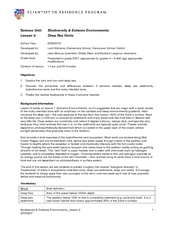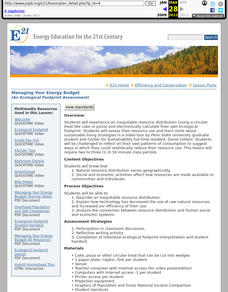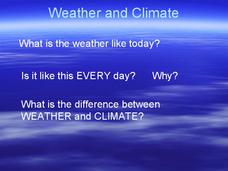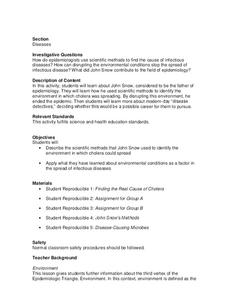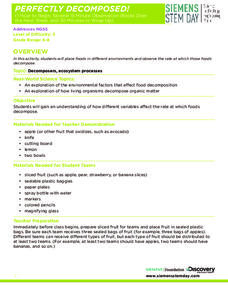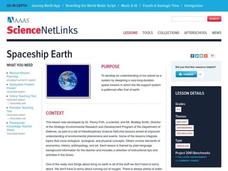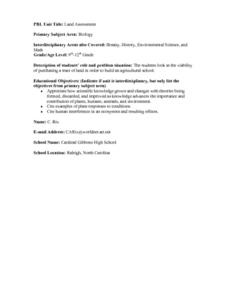Curated OER
Fan 3: Sort and Color!
Pupils explore the concept of recycling. In this environmental stewardship lesson, students discover how to recycle and compost. Pupils complete an activity that requires them to sort recyclable items.
Curated OER
Deep Sea Vents
Students study the vent and non vent deep sea and see the differences in habitats. In this investigative lesson students complete a worksheet and work in groups.
Curated OER
Environmental Education
Second graders examine how their choices affect the environment. They identify different types of pollution and its source. They ask questions to end the instructional activity.
Curated OER
Search a Word
Students review vocabulary associated with solid waste management. They complete a word search to familiarize themselves with the options of solid waste management including varying costs and environmental impacts.
Curated OER
No Fossils in This Fuel!
Students explain how technology leads to a cleaner environment. They gain hands-on experience with ethanol as a fuel alternative.
Curated OER
Solar System
Students analyze theories on how the solar system was formed. In this solar system activity students explain the rotation and revolution of motion.
Curated OER
Green Roof Design
Students design a heat and water conserving "green roof". In this urban environmental lesson, students will design a heat and water conserving "green roof" to improve a building's energy profile.
Curated OER
Elmer's Glue Crew
Learners practice cleaning up the environment by identifying wasteful behaviors in their school. In this arts and crafts lesson plan, students create "eco-inspector" binoculars using Elmer's glue, plastic wrap, and construction paper....
Curated OER
Natural Hazards
High schoolers evaluate the hazards of naturally occurring events. After watching a video concerning safety hazards, students work in groups to discuss the safety issues involved in taking a trip to a mountainous region. ...
Curated OER
Energy Panel Hearings: "Your Town", Saskatchewan
Tenth graders access information to participate in a debate about whether a power plant should be placed in their town. They research an assigned point of view.
Curated OER
Managing Your Energy Budget
Students experience an inequitable resource distribution and electronically calculate their own Ecological Footprint. The assess their resource use and learn more about sustainable living strategies in a video tour by Penn State...
Cornell University
Bacteria Take Over and Down
Bacteria outnumber all other forms of life on Earth. Scholars observe the growth of bacteria in petri dishes to understand their role in maintaining good health. Then, they observe the growth of bacteria after they introduce...
Curated OER
Transportation and Environment
Students make an eco-friendly vehicle to help make transportation better for the environment. In this transportation lesson plan, students learn how transportation inventions are bad for the environment. They then see how engineers have...
Chicago Botanic Garden
Introducing Ecosystem Services
Purifying air and water, providing soil in which to grow crops, and moving water through its natural cycle are all services an ecosystem provides that benefit humans. Lesson four in a series lets learners explore and discuss the value of...
Chicago Botanic Garden
Introducing Ecosystem Services
Ecosystems provide many things humans not only use but also need in order to survive. The last lesson in the series of seven introduces scholars to the idea of ecosystem services, that ecosystems provide humans with many things we need....
National Institute of Open Schooling
Radioactive Pollution
Radioactive pollutants can enter the body through ingestion, inhalation, absorption, or injection. The last lesson in a series of 36 introduces pupils to radioactive pollution. They study its sources, both natural and man-made, its...
Curated OER
Weather and Climate
It's hot today, but is that the weather or the climate? This colorful presentation isolates both concepts to allow for better understanding by covering the positioning of the planet, making comparisons of land versus water, and looking...
Population Connection
The Carbon Crunch
Carbon is in the air; should we care? Teach the class why it is important to pay attention to carbon levels and how the world population and various countries across the globe affect the carbon levels in the atmosphere. High schoolers...
Centers for Disease Control and Prevention
Diseases
During a cholera outbreak, scientists presented two theories; one theory was based on miasma and the other on germs and contaminated water. The lesson looks at the scientific process for finding the real culprit.
Rainforest Alliance
Investments in Forest Carbon
One hundred metric tons of CO2 can accumulate in one acre of forest over time—that's a lot of carbon! In the activity, groups of middle school learners determine what makes forests important. They then solidify the concept by using a...
Discovery Education
Perfectly Decomposed!
We all know someone who won't eat the banana with a brown spot, the grape with a dimple, and the apple with a bruise. Scholars use different fruits to explore what happens when fruits really start to decompose. They set up an experiment...
Curated OER
Spaceship Earth
Middle schoolers develop an understanding of our planet as a system by designing a very-long-duration space mission in which the life-support system is patterned after that of earth.
Curated OER
Land Assessment
Students work in small groups on a problem based learning activity. Students are presented with a problem of buying land to use for educational purposes only and must determine if it is feasible to buy it based on soil analysis and plant...
Curated OER
Water Cycle Reading and Writing
Here is a great way to get pupils to express a scientific concept in a fun way. After hearing the story of Walter the Water drop and learning facts about the water cycle, the class will write a creative expository piece describing what...



